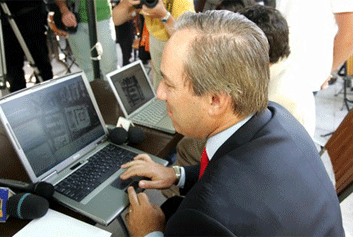BRYZA και ZEYNO BARAN...
Maybe Borat Would be BetterDEPARTMENT Washington BabylonBY Ken Silverstein and Sebastian Sosman - HARPER'S MAGAZINE
“Since the 2003 Tulyakev Reforms, Kazakhstan is as civilized as any other country in the world. Women can now travel inside of bus. Homosexuals no longer have to wear blue hats. And age of consent has been raised to eight years old. Please, captains of industry, I invite you to come to Kazakhstan, where we have incredible natural resources, hard working labor, and some of the cleanest prostitutes in whole of central Asia.”
Those are the words of Borat, the fictional Kazakh TV reporter and the alter ego of British comic Sacha Baron Cohen. They're fiction, but the truth about Kazakhstan is pretty bad, especially when it comes to Kazakh President Nursultan Nazarbayev, who visits the White House today.
While the agenda for his meeting with President Bush has not been published, there are a few topics they're likely to avoid. One is corruption—a delicate subject given that, this coming January, American prosecutors will be in court seeking to prove that James Giffen, a former consultant to Nazarbayev, funneled $78 million in oil kickbacks to the president on behalf of American oil companies.
There's also the question of democratization. Nazarbayev has severely restricted (and in some cases evicted) American groups charged with promoting political reform. Yesterday Senator Russell Feingold noted that the Bush Administration has kept very quiet about the invitation it extended to Nazarbayev. “I don't blame them,” he explained. “President Bush has said that his goal is to spread democracy and the rule of law around the world. But this goal is hard to reconcile with his support for one of the world's most repressive and corrupt dictatorships.”
Some administration officials argued against the visit, but their protests were overcome by others who claimed that Nazerbayev should be rewarded for his support in the “war on terror” and for his status as an important energy partner. Among the Kazakh despot's most ardent champions was David Merkel, the hard-line director for European and Central Asian affairs at the National Security Council.
In the mid-1990s, Merkel worked for the International Republican Institute in Moscow, where he achieved little. I'm told that he learned little more than a few words in Russian and that his unofficial headquarters was the Starlight Diner, an expat hangout known for its tasty cheeseburgers and thick chocolate shakes.
Merkel also once held a staff position with the Senate Foreign Relations Committee under Jesse Helms during the enlightened senator's twilight years in office. There Merkel championed the NATO expansion that brought in Poland, the Czech Republic, and other central-European states.
Nazerbayev's visit was also backed by Matt Bryza, the deputy assistant secretary of state for European and Eurasian Affairs. Bryza previously served at the National Security Council and before that was deputy to the special advisor to the President and secretary of state on Caspian Basin energy diplomacy, where he “ coordinated the U.S. government's inter-agency effort to develop a network of oil and gas pipelines in the Caspian region.” In other words, Bryza's task has been to secure U.S. access to central Asia's hydrocarbon bounty.
In January of this year, as part of an effort to muster support for a trans-Caspian pipeline, Bryza flew to Turkmenistan to meet with one of the world's most eccentric tyrants, Saparmurat Niyazov, the great Turkmenbashi. “Stability requires legitimacy, which flows from democracy,” Turkmenbashi, who once commissioned the construction of a thirty foot gilded statue of himself that rotates with the sun, assured Bryza during their encounter.
Bryza's longtime paramour Zeyno Baran has worked for several think tanks, including the Hudson Institute, where she is currently employed. Baran, it appears, has never met a Caspian dissident whom she didn't dismiss as an Islamist terrorist. In a 2004 interview with the Washington Times, she noted that a recent suicide bomber in Uzbekistan had been female and predicted that “the next set of attacks in the United States will use blonde, blue-eyed women.” Along with Fred Starr of the Central Asia and Caucasus Institute, Baran earlier this year presented a propaganda video prepared by the Uzbek government to counter widespread condemnation of the 2005 Andijan massacre.
Starr himself weighed in on the Nazarbayev visit in Thursday's Washington Post, providing a predictable justification for closer ties with the Kazakh regime, and dismissing the Giffen case as old news that had its origins “more than a decade ago.” He also told readers that the crucial 2005 elections—which most independent observers denounced as badly flawed—were actually run in a “generally transparent manner.” But Starr failed to mention the suspicious mid-campaign suicide of one of Nazarbayev's most outspoken political opponents, who, according to reports, demonstrated astonishing reflexes in his last moments when he managed to shoot himself in both the chest and the head.
That's business as usual in Kazakhstan—and playing host to this sort of dictator, it turns out, is business as usual at the White House.
.jpg)

No comments:
Post a Comment